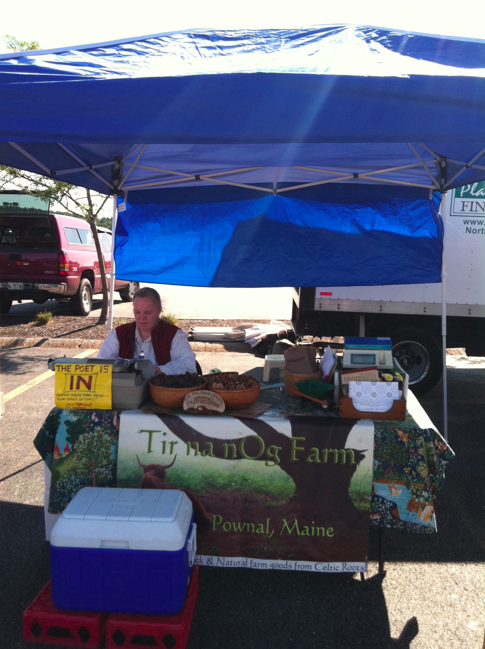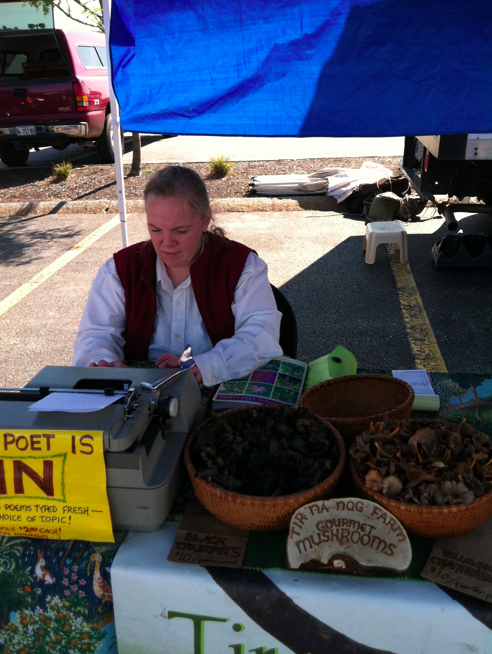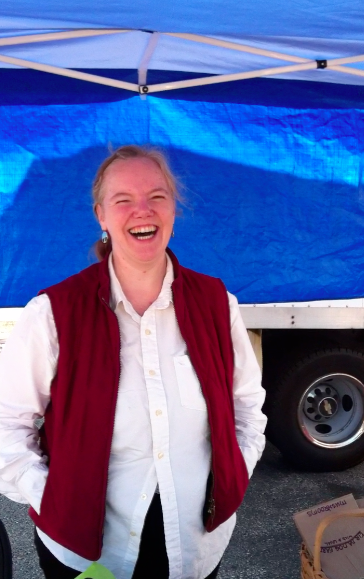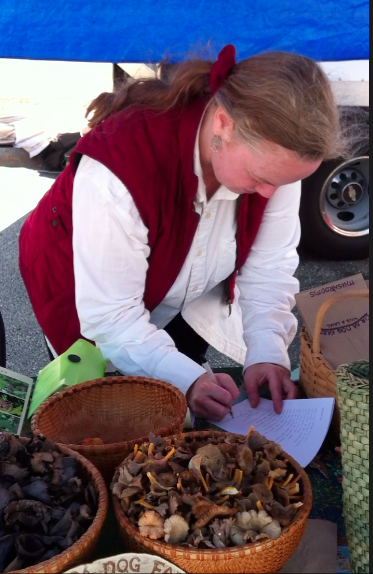Who: Holly S. Morrison
What: Custom Poems Picked Fresh
When: Wednesdays
Where: Portland, Maine farmers’ market
“Open Door” features audio, video, and online media to document dynamic interactions between poetry and its audience. “Open Door” showcases performance, scholarship, and engagement outside the usual boundaries of slams, workshops, and book publications. This week: Custom Poems Picked Fresh!
***
I still remember poems I’ve lost—the awesome one I wrote in gilded letters in a dream and forgot as I awoke, the haunting one I heard in my mind one dawn in the woods with no pen at hand, the urgent one I phoned into an answering machine that got erased. Sometimes I lose them simply because I can’t read my own handwriting. And sometimes I physically lose them; I still haven’t found the paper napkin with the poem I wrote for Obama’s inauguration while walking in a field at the Black Earth Institute in Wisconsin.
Like most poets nowadays, I think of my craft as a gift I can give to the world, and for the most part I accept gracefully the fact that I don’t often get paid to write. But as I learned recently, when push comes to shove, it turns out I am not as detached as I might seem. Recently at my local farmers market, I met someone who showed me that, compared to her, I have a deep attachment to my work. And the irony is, she was the one being paid.
I’ve only seen customized poems for sale in public three times: Pagan Neil’s festive, improvised recitations in San Francisco’s Washington Park in the mid-1980s; the handwritten poems being hawked out of the bike basket of a tired-looking poet last summer on Boston Common; and the “Custom Poems Picked Fresh: Your Choice of Topic” on offer at a small Wednesday farmers market in the outskirts of Portland, Maine. There, among the tables of apples, squash, and brussel sprout stalks, I encountered a hand-lettered sign reading, “The Poet is In,” nestled among three types of local wild mushrooms.
Holly S. Morrison was the name of the poet. While arranging delicate piles of hedgehog mushrooms, black trumpets, and yellow chantarelles into a small paper bag for me at the Tirnanog Farm table, Holly told me she’d been writing poems for years but had just put up the “Poet is In” sign at the market a few weeks earlier. On an average market day she had been selling 2 or 3 poems. Topics vary, including poems on ordinary personal experiences such as moving into a new house or retirement. Of course, I had no choice but to order one, and Holly was happy to write me a love poem on the spot for my husband Glen, emphasizing my gratitude for his support and kindness, for $5.00.
I browsed the honey and beeswax candles at a neighboring table while Holly began clacking away on her manual typewriter. And I found myself reflecting on her smiling response to the final question I had asked her: she doesn’t keep copies of the poems for herself. I found myself feeling an unexpected pang of jealousy at this detachment, this acceptance of letting poems go, as if I had encountered a monk making a sand mandala, or the street sax player in Joni Mitchell’s classic song, “For Free.”
Though I write for free and Holly writes for money, I only give away the writing of the poem; she relinquishes the right to keep the poem. Many contemporary poets might feel that selling poems devalues our art. But it seems to me that Holly’s approach to poetry also participates in the sublime economy Lewis Hyde describes in The Gift, the classic book that helped so many artists better understand their art and taught me, in my twenties, how to survive as a poet.
According to Hyde, the function of art is to participate in a sacred gift economy that links giver, receiver, and the spiritual world. Art’s gift offers contemporary humans an essential alternative to the deadening commercial system. But in practice, it’s not so simple for a poet to give away the gift of poetry nowadays. Those who receive our gifts tend to be limited to critics, students, or other poets; the gifts of a “professional” poet get tangled up in names, reputations, career obligations, and previous bodies of work.
By selling one-of-a-kind poems and not even keeping a copy, Holly moves poetry out of the literary economy in which so many contemporary poems are enmeshed. Instead, she moves it along into the lush marketplace of daily life where all of us can meet on a human footing, helping each other satisfy our needs for life’s irreplaceable gifts of food and beauty and meaning.
Frost once observed that poetry, along with everything else, must “come to market.” I am grateful to see Holly’s poems in the market along with mushrooms and apples, making their way in the world of human needs, eaten and trusted like food. I’ve written many love poems and look forward to writing many more, but I was grateful not to do it myself this time. In selling me a poem, Holly gave me a gift I can share with you:
ESSENTIAL
By Holly S. Morrison
Like the clouds that hold
The moon, lifting it so gently
Into place in the darkening
And heavenly array,
Or a young sapling’s sway,
Uplifted by the roguish, laughing wind,
Or the bedrock where the freshet’s
Spring begins,
You are that elemental,
You are that solid earth, that fire,
That rush of inspiring air . . .
You are heaven and there
Holding, healing, encircling
As needful and beloved
As the ocean is full of life.
Annie Finch is a poet, translator, cultural critic, and performance artist. She is the author of seven...
Read Full Biography





